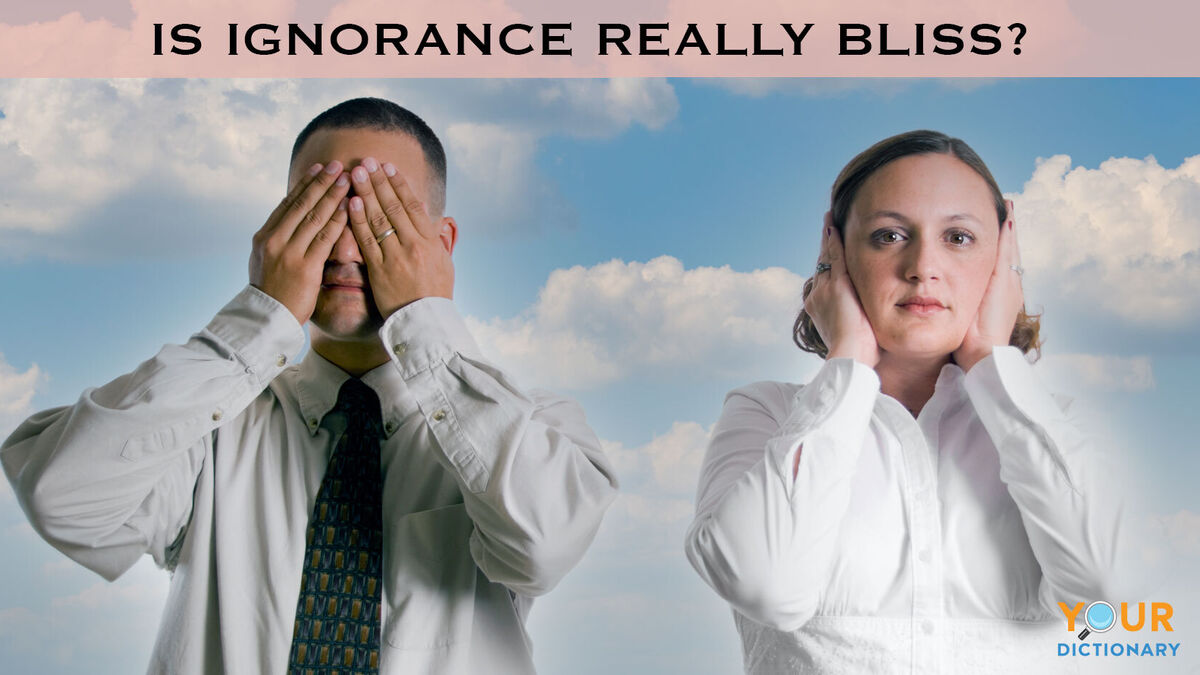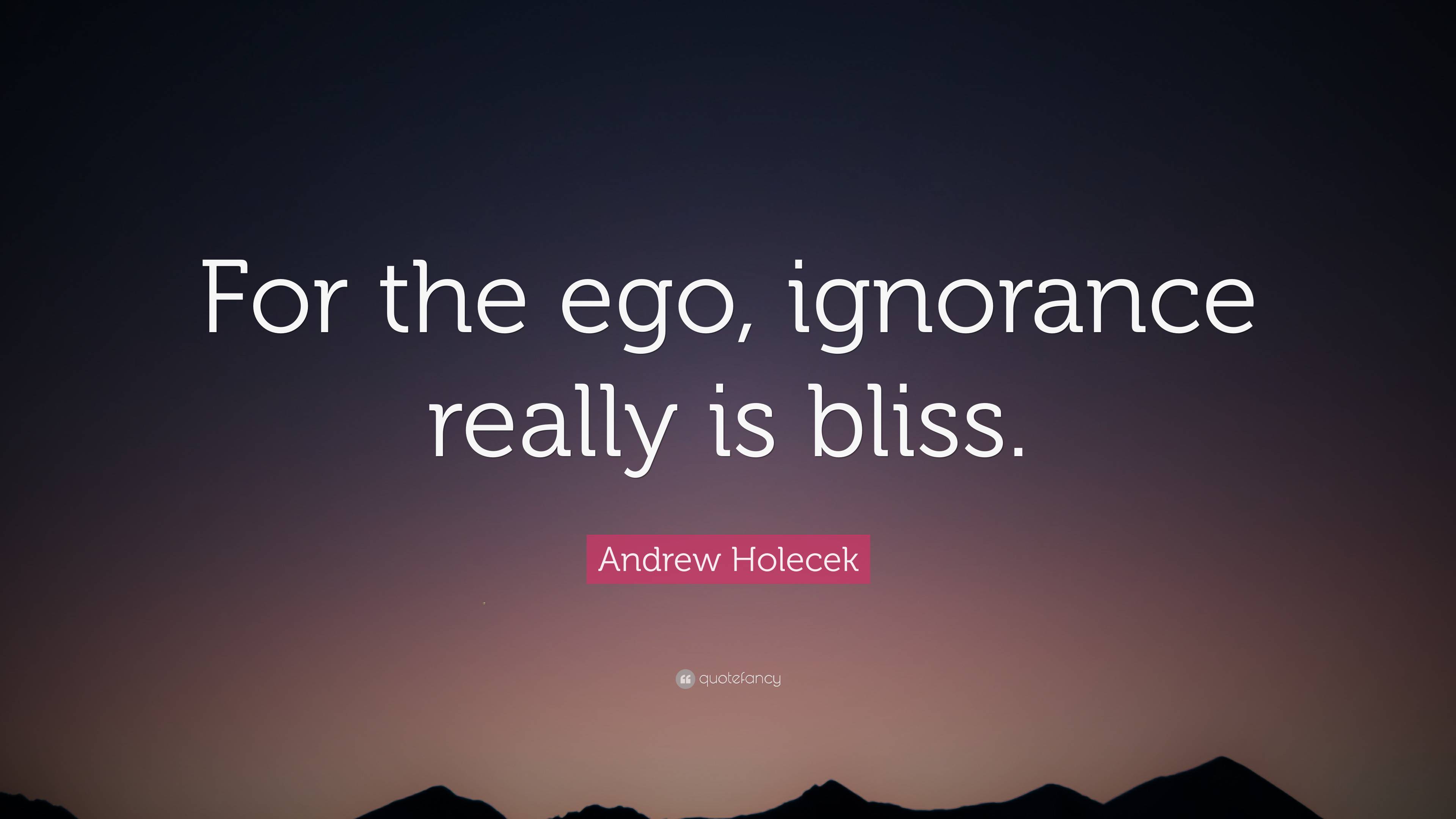Ignorance is often thought of as bliss, as the saying goes, “What you don’t know can’t hurt you.” In some cases, this may hold true. Ignorance can shield us from the harsh realities of the world, allowing us to live in a state of blissful ignorance. However, this bliss is often short-lived and can come at a cost. Ignorance prevents us from fully understanding the consequences of our actions and can lead us down a path of destruction. It hinders our ability to make informed decisions and can leave us vulnerable to manipulation and exploitation.
Ignorance may provide temporary comfort, but in the long run, it can lead to regret and missed opportunities. It is important to seek knowledge and educate ourselves in order to make well-informed choices and live a fulfilling life. While ignorance may offer temporary respite from the harsh realities of the world, true bliss can only be achieved through knowledge and understanding.

Understanding Ignorance: Definition and Implications
Ignorance can be defined as a lack of knowledge or awareness about a particular topic or issue. It is not necessarily a negative trait, as everyone is ignorant about something at some point in their lives. However, ignorance can have serious implications when it comes to making important decisions or forming opinions. When people are ignorant about a certain topic, they may make uninformed choices that can have negative consequences.
For example, someone who is ignorant about the effects of climate change may not take steps to reduce their carbon footprint, leading to further environmental damage. Additionally, ignorance can lead to misunderstandings and conflicts between individuals or groups, as people may make assumptions based on limited or incorrect information. In today’s fast-paced world, where information is constantly changing and evolving, it is important to acknowledge our own ignorance and actively seek out knowledge in order to make informed decisions and have meaningful discussions with others. By recognizing and addressing our ignorance, we can work towards building a more informed and understanding society.
The Case for Ignorance: When Not Knowing Can Be a Comfort
In a world where information is constantly bombarding us from all sides, the idea of ignorance can actually be quite comforting. Sometimes, not knowing can be a way to protect ourselves from the overwhelming complexities of life. Ignorance can provide a sense of peace and simplicity in a world that is often chaotic and confusing. It can allow us to focus on what truly matters and avoid getting caught up in the minutiae of every little detail.
Ignorance can also be a form of self-preservation, shielding us from harsh realities or uncomfortable truths that we may not be ready to confront. It can be a way to maintain a sense of innocence and purity in a world that can often be harsh and unforgiving. Ignorance can also be a way to maintain a sense of wonder and awe in the face of the unknown, allowing us to approach life with a sense of curiosity and openness. So, while knowledge is certainly valuable and important, there are times when not knowing can be a source of comfort and solace in an increasingly complex and overwhelming world.

Knowledge vs. Ignorance: The Psychological Impact
Knowledge and ignorance have a profound psychological impact on individuals. When someone is knowledgeable about a certain topic, they often feel more confident and empowered. This can lead to a sense of fulfillment and satisfaction in their abilities. On the other hand, ignorance can lead to feelings of insecurity and doubt. When someone lacks knowledge, they may feel lost or confused, which can contribute to feelings of inadequacy.
Additionally, ignorance can lead to misunderstandings and miscommunication, which can further exacerbate feelings of isolation and confusion. In a society that values knowledge and expertise, ignorance can also lead to feelings of exclusion and marginalization. On the contrary, knowledge can open doors to new opportunities and experiences, fostering a sense of growth and development. Ultimately, the psychological impact of knowledge vs. ignorance can greatly influence an individual’s sense of self-worth and overall well-being. It is therefore important for individuals to continually seek out knowledge and information in order to enhance their understanding of the world around them and to cultivate a sense of empowerment and confidence.
When Ignorance Hurts: The Consequences of Staying Uninformed
Ignorance can have detrimental consequences when individuals choose to remain uninformed about important issues. By choosing to stay in the dark, individuals may inadvertently harm themselves or others by making decisions based on misinformation or lack of knowledge. This can lead to negative outcomes in various aspects of life, including relationships, health, and personal growth. When individuals remain ignorant, they may miss out on opportunities for growth and learning, hindering their ability to make informed decisions and navigate the complexities of the world.
Ignorance can also perpetuate harmful stereotypes and prejudices, leading to division and conflict within society. In today’s fast-paced world, where information is readily available at our fingertips, choosing to remain uninformed is a disservice to oneself and others. It is essential for individuals to actively seek out knowledge and engage in critical thinking to avoid the consequences of ignorance. By staying informed and open-minded, individuals can make better decisions, foster understanding and empathy, and contribute positively to their communities. In conclusion, the consequences of staying uninformed can be far-reaching and damaging, highlighting the importance of actively seeking knowledge and staying engaged with the world around us.

Finding a Balance: Navigating Between Awareness and Contentment
Finding a balance between awareness and contentment is a delicate dance that many struggle with in today’s fast-paced world. On one hand, being aware of our surroundings and the issues that affect us is crucial for personal growth and societal progress. It allows us to stay informed, make educated decisions, and take action when necessary. However, constantly being tuned into the news and constantly striving for more knowledge can lead to feelings of anxiety, overwhelm, and discontent.
On the other hand, finding contentment in the present moment and being grateful for what we have can bring a sense of peace and fulfillment. It allows us to appreciate the simple joys in life and find happiness in the here and now. However, too much contentment can lead to complacency and a lack of motivation to strive for improvement. The key is to strike a balance between these two extremes, to be aware of the world around us without letting it consume us, and to find contentment in the present moment while still striving for growth and progress. This balance is not easy to achieve, but with mindfulness, self-reflection, and a willingness to adapt, it is possible to navigate between awareness and contentment in a way that allows us to live a fulfilling and meaningful life.
